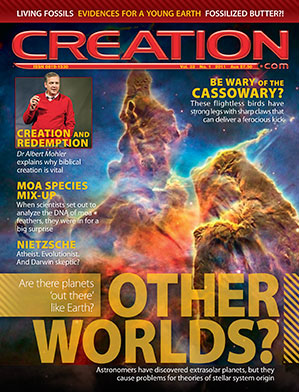Creation and Redemption: A Conversation with Albert Mohler

When R. Albert Mohler Jr became president of Southern Baptist Theological Seminary in 1993, aged only 33, the institution had retreated from its original stand on the authority of Scripture. Dr Mohler’s first task as president was guiding this institution back toward its original commitment to the inerrancy and sufficiency of Scripture. Previously, any seminary’s slide down to liberalism was regarded as irreversible, but Dr Mohler insisted that lecturers must hold to the statement of faith they had agreed to when they took the job (otherwise they would be there under “false pretences”).
Today, Mohler continues to lead this seminary, one of the most important American evangelical institutions of higher education, where he also holds a professorship in theology. Mohler is a scholar, but he is not the stereotypical academic living quietly in scholastic cloisters. He has become widely known as a perceptive observer and commentator on culture and as one of the most articulate Christian spokesmen in America today. Dr Mohler recently talked with Lael Weinberger about reclaiming the importance of Genesis in the church.
Lael Weinberger: Why is it worthwhile for us to spend time on a contentious issue like the interpretation of the first few chapters of Genesis?
Dr Albert Mohler: The church’s central message is the cross and resurrection of Christ. It is the message we call the gospel, the good news of salvation to sinful humanity through the atoning work of Jesus Christ. But that message comes to us in the midst of a larger truth, without which there is no context for either affirming or understanding the gospel of Jesus Christ. And that is the entire story of God’s dealing with humanity that includes the Genesis account of how God brought the world into being. Scripture never separates the knowledge of God the Redeemer from God the Creator; almost every Christian heresy can be traced in some form to an attempt to separate God the Creator from God the Redeemer.1 Christianity stands against that. The gospel of Jesus Christ makes no sense unless you put it in the context of the total story of God’s creative and redemptive work, from Genesis to Revelation.
LW: If evangelicals today are avoiding Genesis and deemphasizing its value, what does that say about their overall view of Scripture, God, and man?
AM: Jesus Himself says that we cannot understand Him apart from the Old Testament Scripture (John 5:39). The Gospel of Matthew takes great pains to demonstrate time and again that these things happened in order that the Scriptures might be fulfilled. It makes no sense whatsoever for a Christian to suggest that we have merely the New Testament as our authoritative Scripture. This false teaching is deadly and will undermine the gospel itself. The Bible is God’s word to us—every single word inspired by God.2 It is a slander not only against the Scripture, but against God Himself, to suggest that we can do without any portion of Scripture.
LW: What are the problems with an old-earth position?
AM: The first problem is exegetical—that is, it has to do with the interpretation of Scripture. I’m absolutely certain that there is no problem when one holds to a young-earth position. But if you hold an old-earth position, you have to employ interpretive methodologies in Genesis 1–3 that most evangelicals would recognize as being invalid in any other context.3 There are huge exegetical problems, and they impact our understanding of the rest of Scripture.
The second and even more serious issue is theological. With an old-earth position, held with any consistency, we have a very difficult time explaining how we have an historical Adam and Eve as the first parents of all humanity. The fossil record is interpreted by “old earthers” as evidence of age, yet on that interpretation, it is in conflict with the historicity of Adam and Eve and their position as father and mother of all humanity. From that flow other theological problems. If you do not have a historical Adam, then what are we to make of Paul speaking of the first Adam and the last Adam?4 [1 Corinthians 15:21–22, 45, Romans 5:12–19] It’s a huge problem.
LW: If we lack a historical Adam, what are the implications for the doctrine of sin and redemption?
AM: The historicity of the Fall is at stake. The Bible traces all human sinfulness to the fact that Adam and Eve sinned. Adam, as the head and father of the human race, is important not only for his own sin, but because in Adam we all sinned. The Genesis account also teaches that God’s judgment on that sin has cosmic effects.5,6 If you adhere to an old-earth position, you have a very difficult time explaining how the effects of the Fall—death, disease and suffering—show up long before Adam and Eve.
LW: Are Christians being equipped to deal with these issues?
AM: There is some good news and some bad news on that front.
The good news is that most evangelical Christians—for that matter, most Americans—reject the theory of evolution. The theory of evolution has not captured the hearts and minds of the vast mainstream of American Christians. But that’s only good news for a short time.
The bad news is that Christians who reject the theory of evolution are often unable to explain why, much less to provide any adequate understanding of the Bible’s message of creation and redemption. We have not only a failure to connect the dots; in too many churches we have a failure to teach the basic truths that will be dots we might want to connect. A failure of biblical preaching here has been catastrophic, and Christians have failed to know and study God’s Word. Doctrinal illiteracy has infected much of evangelicalism, where experience seems to rule over knowledge, and intuition seems to dominate over true intellectual engagement. This bad news gets worse, because generation by generation there will be a greater acceptance of naturalism and evolution simply because the younger generation is so steeped in the educational process and in a secular culture where that’s taken for granted.
LW: Are pastors being equipped? Are evangelical seminaries preparing pastors to address these issues?
AM: That will vary institution by institution. The schools that are taking what I believe is the right approach are those putting all these issues within the grand meta-narrative of the Scripture: creation, fall, redemption, and consummation. Where we’re not just taking issue “A” or issue “B”, but we’re putting all of this within Scripture’s presentation of a redemptive historical pattern. I desperately want my students to understand that you can’t walk into a room and talk about redemption unless you are going to talk about what you are being redeemed from. You can’t explain sinfulness without reference to the Fall. You can’t explain the Fall without reference to the entire cosmos as the theatre of God’s glory, and human beings as the only creatures made in God’s image. It’s a comprehensive whole. There are many evangelicals who will get all the basic answers right if you ask them the right questions. But the true test is whether the pastor can take all those right answers and put them in the context of the totality of God’s revelation of Himself in Christ.
LW: Some Christians want to defend ‘design’ in nature and leave the Bible out of the debate for strategic reasons. Is this a concern?
AM: Yes, of course it is. Any focus upon creation without the gospel of redemption fails at being Christian. There will be any number of persons who believe in a biblical understanding of creation and who will go to hell because they never actually understand anything about the Cross and Resurrection of Christ. Creation is necessary, but it is not sufficient. Our gospel takes us from creation to redemption. The Intelligent Design movement contains at its core a brilliant intellectual tool. That tool is a fascinating and extremely effective way of showing the fallacies of Darwinism. But this doesn’t get you anywhere near the gospel of Christ. The ID movement has had some appeal because it seems to provide a way to reject evolution without having to bring on the entire scandal of creation. If ID is a worldview, it’s a limited and sterile worldview. We’re not saved because God is a designer; we are redeemed because God is Creator and Redeemer in Christ. A focus on design exclusively is very unhealthy. Similarly, I want to remind Christian organizations committed to the inerrancy of Scripture that their purpose is not merely to defend Genesis, but to defend Genesis and the authority of Scripture in order to help persons get from Genesis to the gospel.
LW: What would be your advice to pastors trying to teach accurately on creation?
AM: Most pastors underestimate how hungry their congregations are to have this question addressed from the pulpit. This is where they live. This is where their kids live. This is where they are concerned that their kids are not being armed and equipped for the kind of intellectual combat they are going to face. I would say to pastors that, if you haven’t preached on this, your people are hungry and thirsty for you to do so. My encouragement would be to remember the redemptive-historical framework—that biblical story of Creation, Fall, Redemption, Consummation. The apostle Paul would never have preached creation as he does in Acts 17 without getting to the gospel. That’s a good model for us. We need to make very clear that every word of Scripture is pointing us to the gospel of Christ.
LW: Thank you, Dr Mohler.
References and notes
- E.g. the Arian heresy, similar to modern Jehovah’s Witness doctrine, made Jesus a created being instead of Creator. Return to text.
- See creation.com/bible, creation.com/authority. Return to text.
- I.e. they reject the plain meaning because of ‘science’. But ‘science’ also says that dead men don’t rise and virgins don’t conceive, but evangelicals would accept the Resurrection and Virginal Conception as historical facts. Liberals are just more consistent, and deny these portions of Scripture as well. Return to text.
- Cosner, L., Romans 5:12–21: Paul’s view of a literal Adam, Journal of Creation 22(2):105–107, 2008; The Resurrection and Genesis, Creation 32(3):48–50, 2010. Return to text.
- See Sarfati, J., The Fall: a cosmic catastrophe: Hugh Ross’s blunders on plant death in the Bible, Journal of Creation 19(3):60–64, 2005; creation.com/plant_death. Return to text.
- Smith, H., Cosmic and universal death from Adam’s Fall: an exegesis of Romans 8:19–23a, Journal of Creation 21(1):75–85, 2007; creation.com/romans8. Return to text.
Note: References added by the editors.




Readers’ comments
Comments are automatically closed 14 days after publication.